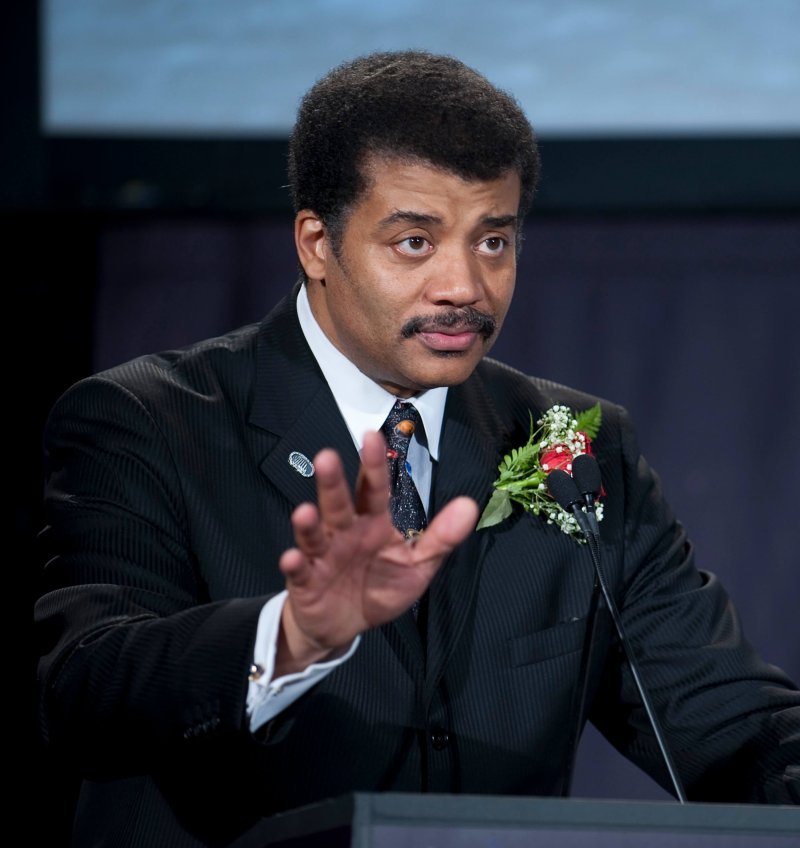An old video of Neil deGrasse Tyson defending GMO foods has recently been highlighted in an article from Mother Jones. The beloved Cosmos host emphatically says that there is nothing unnatural about GMO foods because humans “have systematically genetically modified all the foods, the vegetables and animals, that we have eaten ever since we cultivated them.” Responses to the video have appeared on the web, from the Washington Examiner noting that Tyson’s pro-GMO stance “may come as a bit of a heartbreak to greenies on the far left,” to Vox describing Tyson as having broken down “one of the silliest anti-GMO arguments.”
“I’m amazed at how much objection genetically modified foods are receiving from the public,” Tyson says in the video. It is unclear when or where the video takes place. “It smacks of the fear factor that exists at every new, emerging science, where people don’t fully understand or know the consequences, and therefore reject it. What most people don’t know, but they should, is that practically every food that you buy in a store for consumption by humans is genetically modified foods.”
Watch Tyson in the video embedded below:
“We are creating and modifying the biology of the world to serve our needs. I don’t have a problem with that, as we’ve been doing it for tens of thousands of years,” Tyson says. “So chill out.”
Several responses point out that Tyson did not address other concerns that people have about GMOs. Tyson talks about the notion of genetic modification in general, and explains why there is nothing unusual about tinkering with our food’s genetic makeup: humans have been doing it for 10,000 years. Vox notes that Tyson did not discuss some legitimate concerns over GMOs such as their safety, their impacts on the environment and the way biotech companies have profited from them. The original Mother Jones article that first posted the video points out:
In fairness, critics of GM foods make a variety of arguments that go beyond the simple question of whether the foods we eat were modified prior to the onset of modern biotechnology. They also draw a distinction between modifying plants and animals through traditional breeding and genetic modification that requires the use of biotechnology, and involves techniques such as inserting genes from different species.
Another Mother Jones article responding to Tyson’s video criticized him for using the “lamest defense of GMO foods ever.” Kevin Drum writes:
This is a very common defense of GMO foods, but I’ve always found it to be the weakest, least compelling argument possible. It’s so weak, in fact, that I always wonder if people who make it are even operating in good faith.
It’s true that we’ve been breeding new and better strains of plants and animals forever. But this isn’t a defense of GMO. On the contrary, it’s precisely the point that GMO critics make. We have about 10,000 years of evidence that traditional breeding methods are basically safe. That’s why anyone can do it and it remains virtually unregulated. We have no such guarantee with artificial methods of recombinant DNA.
The Washington Examiner notes that Tyson, being a celebrated scientist among liberals for this stance on issues like climate change, may have caused some “heartbreak” to his fans who are “greenies on the far left.” The Examiner cautions:
At a time when acts of ideological impurity are met with wild-eyed, spittle-flecked shrieks of “Burn the heretic!” it’ll be interesting to see if Tyson gets a pass for his GMO tut-tutting.
Plant scientist Mary Mangan has collected several responses on Twitter to this video, including one from the Food Babe, in the Storify embedded below. “I know some folks think the message was not as complete or satisfying as it could be,” Mangan writes. “But I think the level of awareness this raised was worth it. Not every conversation can get to the details of plant breeding and biotechnology.”
Additional Resources:
- GLP Infographic: How crops are modified–Are GMOs more dangerous? Genetic Literacy Project
- Princess Anne rejects brother Prince Charles’ anti-GMO views, Genetic Literacy Project































